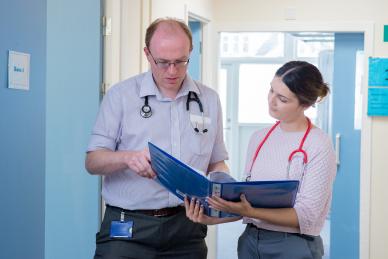Join the College
The College is here to support you at all stages throughout your career to enable you to deliver the highest standards of healthcare to patients.
Empowering medical excellence, shaping healthcare futures.
It provides a new challenge and educational opportunities
There is plenty of scope to take part in research
Good work/life balance
A small specialty so not many posts available
The MSc is based at King’s College London so some travelling is required at times
Dr Dave Colville - S7.
"The opportunity to do something fairly unique within the field of medicine."

Nuclear medicine offers the opportunity to do something fairly unique within the field of medicine. It is different from other medical specialties in that it is mainly an imaging specialty with a therapeutic aspect. It is however also very different to the anatomical imaging of radiology. I chose this specialty for a number of reasons. It provided me with a new challenge and educational opportunities including the MSc and research. The work/life balance was attractive and the training allows for the continued involvement and participation in general medicine.
Attend a nuclear medicine department and see the wide range of procedures that are involved.
If possible, attending oncology clinics where assessments for radionuclide therapies are performed would be of benefit.
A normal Monday morning begins with a PET-CT reporting session including the vetting of any request cards and dealing with any clinical issues which may arise. The afternoon consists of a nuclear medicine thyroid clinic where patients attend for thyroid imaging, are immediately reviewed, given their results, and assessed for radioiodine therapy if required. There is then the daily general nuclear medicine reporting session later in the afternoon. Every day is different and clinical responsibilities are wide ranging and include ward rounds, clinics, multi-disciplinary team (MDT) meetings and administration of radioisotopes.


Nuclear medicine is a unique branch of medicine which uses unsealed radioisotopes for functional imaging and therapeutic procedures.
It is a five-year training programme for dual accreditation in General Internal Medicine (GIM). There is a high intensity general medical year based at a district general hospital (DGH) in the first year. The rest of the training is at a tertiary hospital with good nuclear medicine facilities. Placements are arranged in more specialised areas such as paediatric nuclear medicine, nuclear cardiology and positron emission tomography-computed tomography (PET-CT).
For entry into the training programme, completion of Internal Medicine Training and the MRCP is required. More information about the entry requirements can be found on the JRCPTB website.
There are no other mandatory requirements for entry into training. Good anatomical and physiological knowledge is important and any extra experience in these areas would be beneficial.
There are plenty of opportunities for in-programme research and the MSc in Nuclear Medicine is a central component of training which includes a research module. Involvement in research is actively encouraged within the specialty.

The College is here to support you at all stages throughout your career to enable you to deliver the highest standards of healthcare to patients.